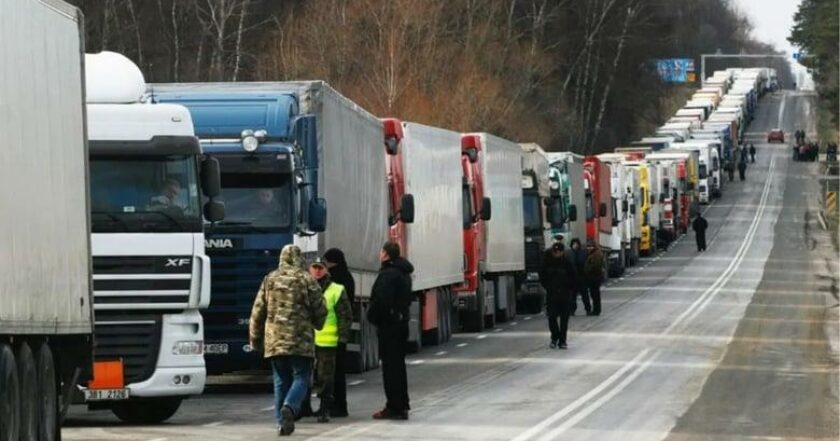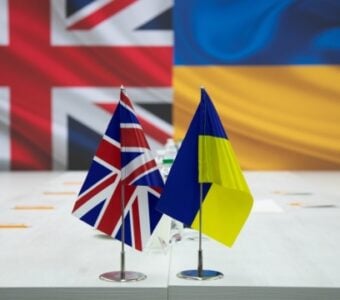Ukraine and Poland agree on partial border unblocking

Фото: Фейсбук / Vasyl Zvarych
Ukraine and Poland have agreed on measures to partially unblock the border. The cancellation or changes to the transport visa-free was not raised
Rubryka reports this with reference to the press service of the Ministry of Community Development, Territories and Infrastructure of Ukraine.
A meeting was held in Warsaw between Deputy Minister of Community Development, Territories and Infrastructure of Ukraine Serhiy Derkach and State Secretary of the Ministry of Infrastructure of Poland, Rafal Weber, chaired by Jadwiga Emilevych, Government Commissioner for Polish-Ukrainian Development Cooperation, and with the participation of the Ministry of Finance and the Ministry of Internal Affairs of Poland.
During the meeting, the parties agreed on several measures, including:
- opening of the "Uhryniv – Dolhobychuv" checkpoint for the passage of empty trucks to increase the border's capacity and reduce the load on other checkpoints;
- creation of separate passes for empty vehicles in the eCherha system at the "Yahodyn – Dorohusk" and "Krakovets – Korchova" checkpoints. It is at these checkpoints that there are physical lanes for empty vehicles directly at the checkpoint on both the Ukrainian and Polish sides;
- launch of a pilot project with registration in eCherha immediately before crossing the border at the checkpoint "Nižankovychy – Malhovice" for a period of one month.
The cancellation or changes to the "transport visa-free" was not discussed.
Polish protesters insist on the operation of "Uhryniv – Dolhobychiv" and "Nižankovychy – Malhovice" only for transport with EU registration. The position is unacceptable for Ukraine and the EU, as it discriminates against other countries.
"The latter was confirmed during the meeting of the Ukraine-Poland-EU Coordination Platform with the participation of the leadership of the European Commission's Directorate for Transport and Mobility (DG MOVE) on November 30," the press service adds.
In the meantime, the Ministry of Reconstruction, together with DG MOVE, is working on solutions that will allow resolving the situation with queues at the border and reduce the tension in the issue of road transport.
"The key positions are to improve the capacity of the existing checkpoints, particularly the effectiveness of phytosanitary and other types of control, to comply with the memorandums regulating the number of trucks allowed across the border. It is also about developing an Action Plan for developing Ukrainian-Polish checkpoints," the press service notes.
What is known about the closure of the Ukrainian-Polish border
Since November 6, Polish carriers have started a strike and blocked several checkpoints, including:
- "Yahodyn – Dorohusk";
- "Krakowets – Korchova";
- "Rava-Ruska – Hrebene";
- "Shegini – Medicine".
Carriers put forward demands, including:
- restoration of permissive relations with Ukraine;
- strengthening of transport regulations;
- ban on registering companies in Poland if their finances and accounting are located outside the EU;
- obtaining access to the Ukrainian system Shlyah;
- division of separate queues for EU cars in the eCherha system;
- allocation of separate queues for empty cars.
The Polish government cannot unilaterally influence the agreement between Ukraine and the European Union on the liberalization of freight transportation, even though this is one of the protesters' demands.
As reported by Rubryka, Polish carriers started an indefinite protest on November 6.
On November 22, the Verkhovna Rada [Ukraine's parliament – ed.] appealed to the new Sejm and Senate of Poland with a proposal to unblock the border for carriers.
In turn, the Ukrainian side created a headquarters to help drivers blocked at the border. A coordinator is in constant contact with each of the three points.
In Poland, a second Ukrainian driver has died near the Korchova-Krakovec checkpoint, where Polish carriers block the border. Kyiv also started collecting data for the evacuation of Ukrainian drivers since it was impossible to agree on it during the negotiations with the local and central authorities of Poland and the EU.
In addition, the President of Ukraine, Volodymyr Zelensky, believes that the situation that arose on the border of Poland and Ukraine happened "because of some political steps of our neighbors." The Poles should be given some time, and the bilateral relations will improve.
Polish protesters do not rule out a complete blockade of the border.




















































